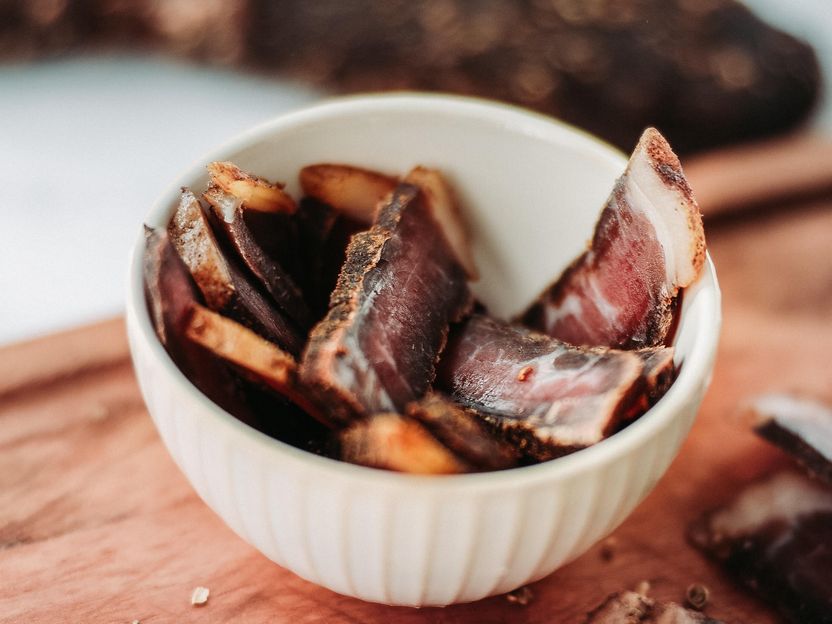The other fake meat: Impossible Foods unveils pork, sausage
After a big year for its plant-based burger, Impossible Foods has something new on its plate.The California-based company unveiled Impossible Pork and Impossible Sausage on Monday evening at the CES gadget show in Las Vegas.
It's Impossible Food's first foray beyond fake beef. The Impossible Burger, which went on sale in 2016, has been a key player in the growing category of vegan meats. Like the burger, Impossible Food's pork and sausage are made from soy but mimic the taste and texture of ground meat.
Impossible Pork will be rolled out to restaurants first. The company isn't yet saying when it will come to groceries. Impossible Foods only recently began selling its burgers in grocery stores, although they're available at more than 17,000 restaurants in the U.S., Singapore, Hong Kong and Macau.
Burger King will give consumers their first taste of Impossible Sausage. Later this month, 139 Burger King restaurants in five U.S. cities will offer the Impossible Croissan'wich, made with plant-based sausage coupled with the traditional egg and cheese. Burger King did a similar test of the Impossible Whopper last year before expanding sales nationwide.
The pork products and the Impossible Burger are made in a similar way. Impossible Foods gets heme _ the protein that gives meat its flavor and texture _ from soy leghemoglobin, which is found in the roots of soy plants. To make heme in high volume, it inserts the DNA from soy into yeast and ferments it. That mixture is then combined with other ingredients, like coconut oil.
The company tweaked the ingredients to mimic pork's springy texture and mild flavor. For the sausage it added spices.
Impossible Pork has 220 calories in a four-ounce serving. That's not much less than a serving of Smithfield 80% lean ground pork, which has 260 calories. Smithfield's animal-derived pork has more total fat, at 20 grams, than Impossible Pork, which has 13 grams. But Impossible Pork has far more sodium, at 420 milligrams. Smithfield has 70 milligrams.
But health concerns are only part of the reason consumers are eating more plant-based meats. Animal welfare and environmental concerns are also a factor. Nearly 1.5 billion pigs are killed for food each year, a number that has tripled in the last 50 years, according to the World Economic Forum. Raising those pigs depletes natural resources and increases greenhouse gas emissions.
``Everything that we're doing is trying to avert the biggest threat that the world is facing,'' Impossible Foods CEO Pat Brown told The Associated Press.
Brown said the company decided pork should be its next product because customers were frequently requesting it. Impossible Foods started working on the new products about 18 months ago and accelerated development in the second half of 2019.
Brown said ground pork is also critical to meeting the company's international expansion goals. While Americans eat more beef and chicken, pork is the most widely consumed meat worldwide, according to the National Pork Board. Chinese consumers eat more than 88 pounds (40 kilograms) of pork per year, compared to 65 pounds (30 kilograms) for Americans.
Brown said he believes a product like Impossible Pork is critical in China, which has limited arable land and relies heavily on imported meat. Last year, Chinese pork prices surged after African swine fever wiped out millions of pigs.
Brown said Impossible Foods is talking to Chinese regulators and potential partners that could make Impossible Pork _ as well as plant-based burgers _ in China.
``This is a huge opportunity for China in terms of its food security,'' Brown said.
Impossible Foods is also waiting for approval from European regulators to sell its products there.
In the U.S., 2019 was a breakout year for plant-based meat. U.S. sales jumped 10% last year to nearly $1 billion; traditional meat sales rose 2% to $95 billion in that same time, according to Nielsen.
Impossible Foods rival Beyond Meat _ which already sells plant-based sausage links _ had a successful public stock offering in the spring. Impossible Foods ran short of burgers in the first half of the year thanks to the buzz from Burger King. After partnering with OSI Group, a food service company, Brown said Impossible Foods produced twice as much of its plant-based meat in the last quarter of 2019 as it sold in all of 2018.
``We have to keep scaling up as fast as we possibly can,'' Brown said.
Brown said he welcomes new competitors in the space, including deep-pocketed rivals like Nestle and Tyson Foods. The meat industry is vast, he said, and plant-based meats are still only around 1% of sales.
His only concern is that plant-based products taste good enough to convince meat eaters to switch.
``A crappy product won't win over meat lovers,'' Brown said. (dpa)
Most read news
Topics
Organizations
Other news from the department business & finance

Get the food & beverage industry in your inbox
By submitting this form you agree that LUMITOS AG will send you the newsletter(s) selected above by email. Your data will not be passed on to third parties. Your data will be stored and processed in accordance with our data protection regulations. LUMITOS may contact you by email for the purpose of advertising or market and opinion surveys. You can revoke your consent at any time without giving reasons to LUMITOS AG, Ernst-Augustin-Str. 2, 12489 Berlin, Germany or by e-mail at revoke@lumitos.com with effect for the future. In addition, each email contains a link to unsubscribe from the corresponding newsletter.
Most read news
More news from our other portals
Last viewed contents

Consumer preferences for sustainably produced meat and meat substitutes in Japan

Climate fee on food could effectively cut greenhouse gas emissions in agriculture while ensuring a social balance
Field test: compostable plastics break down in less than 22 days in industrial composting
Cutting down Swiss potato wastage

Planet A Foods raises $15.4M to power ambitious expansion and bring sustainable cocoa-free chocolate to global customers - Munich-based B2B foodtech startup uses fermentation technology to produce ChoViva

The future of plant-based food and drink in Europe

Bulk solids industry cautiously optimistic for 2023 - Manufacturers in the ventilation and process technology sectors are cautiously optimistic about the future after surviving the Corona crisis

Focus on carcinogenic effects of processed red meat - RPTU researcher receives Emmy Noether grant

Temporary slowdown in meat reduction trend as processed meat sales boom - A resurgence in canned meat saw sales increase an estimated 22% in 2020

Tönnies expands in the veggie market

Acryleast™ receives “organic suitable” status in Europe - EU tightens acrylamide and general organic food and beverage regulations





























































